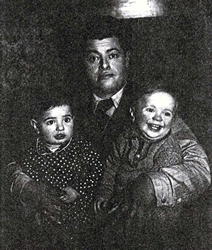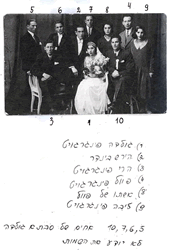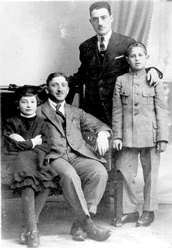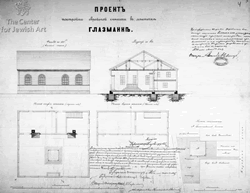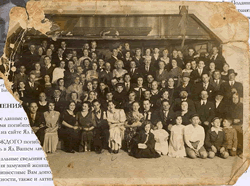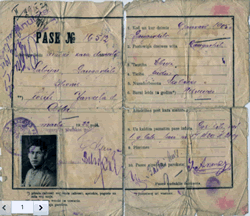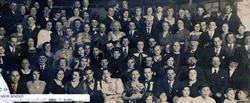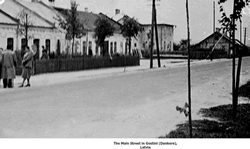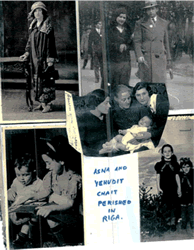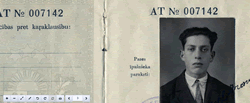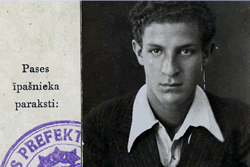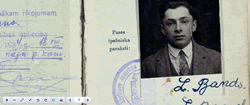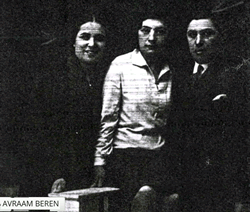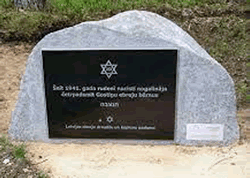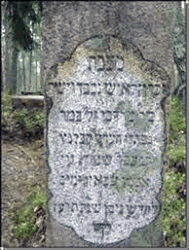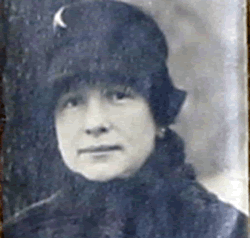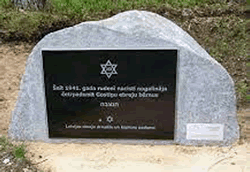Alternate names: Gosti?i [Latv], Dankere [Ger, Yid], Glazmanka [Rus], Glazmanke [Yid], G?azmanka [Pol], Trentelberg [Ger], Guostiniai [Lith], Dankera, Dankere, Dankari, Glasmanka, Glazminka. 56°37' N, 25°47' E , 68 miles ESE of R?ga, 58 miles NNW of Daugavpils (Dvinsk), 10 miles NW of J?kabpils. Merged into P?avi?as in 1956. 1900 Jewish population: 1,064.
#gost-1: Yitzhak Beren with children. The family perished in the holocaust Isaac Beren was born in Gostini, Latvia. Prior to WWII he lived in Aluksne, Latvia. |
#gost-2: The marriage of Golda nee Fingergoit and Hirsh Binder. The wedding took place in Gostini |
#gost-3: Oskar Birnik was born in Gostini, Latvia in 1889. He was a merchant. Prior to WWII he lived in Parnu, Estonia. Oskar was murdered in the Shoah.Page of Testimony Submitted by Yakov Shteingardt |
#gost-4: Jewish Architecture |
#gost-5: Name of Submitter |
#gost-6: Josifs Apters was born in 1905 to Jankels. in Gostini Prior to WWII he lived in Latvia. |
#gost-7: |
#gost-8: The main street in Gostini |
#gost-9: The family of Immediate Family:
|
#gost-10: Joel Aronowitsch was born in Gostini/ Glazmanka, Latvia in 1910. He was a merchant. Prior to WWII he lived in Riga, Latvia. |
#gost-11: Joseph Atlas was born in Glazmanka, Latvia in 1913. He was a shoemaker. Prior to WWII he lived in Riga, Latvia. |
#gost-12: Lev Band was born in Gostini/ Glazmanka, Latvia in 1911. This information is based on the records/documents
|
#gost-13: Nison Atlas was born in gostini/ Glazmanka, Latvia in 1870. Prior to WWII he lived in Riga, Latvia. |
#gost-14: Avraam Beren was born in Dankeri, Latvia in 1907 to Luba nee Genchel. and Hesse Beren. He was a furrier. Prior to WWII he lived in Gostini, Latvia. |
#gost-15: A monument for the Jews who perished P?avi?as Municipality, Gosti?i Location of the monument: |
#gost-16: |
#gost-17: The Jewish cemetery |
#gost-18: Tirza Baschkin nee Schkuy was born in Gostini/ Glazmanka, Latvia in 1889. She was a housewife. Prior to WWII she lived in Riga, Latvia. |
#gost-19: |
#gost-20: |
#gost-21: |
#gost-22: |
#gost-23: |
#gost-24: |
#gost-25: |
#gost-26: |
#gost-27: |
#gost-28: |
#gost-29: |
#gost-30: |
Please share your comments or photos or links for posting on our Guestbook Page here: egl.comments@gmail.com
Gostini
A town in the Daugavpils (formerly Dvinsk) district, Latgale region, south east Latvia.
The settlement was established at the beginning of the 19th century. It developed during the 1860s after the opening of a railway station in the neighboring town, Plavinas.
Gostini united with Plavinas in 1927, but later separated from it in 1933.
Jews began to settle in the place at the beginning of the 19th century, and in 1847 they numbered 192. Most of them were traditional observant Jews.
At the beginning a synagogue, hevra kadisha and "bikkur cholim" (sick visiting society) were founded. Benevolent institutions included "hachnesat hag`dolah" and "malbish arumim". At the beginning of the 20th century there were four synagogues in the town; two were used by the Mitnagdim and one by the Hassidim.
The community was headed by a rabbi and president. The rabbi, Dov-Bar Zeligman, held the rabbinical chair for 41 years from 1875.
A fire, which broke out in 1888, destroyed a number of Jewish owned homes and shops.
In 1897 the community numbered 1,064, being 46% of the population. During World War I, many Jews were forced to flee the town because of the battles which raged in the area.
After the war Jews began to return to the town and communal life was renewed. With the help of the "Joint" (a relief agency of American Jewry) a credit fund was established, and one synagogue and 220 private homes were renovated.
In 1920 there were 544 Jewish inhabitants who comprised 61% of the total population of Gostini.
At the beginning the children studied in a "Talmud Torah". In 1921 a Jewish elementary school was opened, using Yiddish as the teaching language. From 1934 it became a Hebrew-religious educational institution. In 1927 the Chabad Hassidim founded the yeshivah, "Tomchei T`mimim", which was replaced by the yeshivah "Beth Yosef", in 1935.
The community organized a theatrical troupe and in 1930 opened a club, named for H.N.Bialik.
Tailors, shoemakers and butchers later, most of them became merchants.
During the time of the unification of the town with Plavinas, commercial life thrived and the situation of the one of the members of the community owned several stores, and later he established a leather tannery.
After the separation of the two towns the income of the Jews decreased.
The "bund" was active from the beginning of the 20th century. Its members had a central role in the 1905 revolution.
The "Tse`irei Zion" party was organized in the 1920s, and most of the public life of the Jews was concentrated in it. For the youth, branches of "hechalutz" and the Jewish Scouts association "Bar Kochba" were opened. Later on "Hashomer Ha`Tsa`ir-Netzach", "Gordonia" and "Betar" were organized.
In 1935 the Jewish population was 504 out of a total of 933.
The Holocaust period
Following the signing of the accord by Ribbentrop and Molotov on behalf of Germany and the USSR respectively (August 23, 1939), the Soviet Army entered Latvia and installed a Soviet government in the summer of 1940. Jewish enterprises were nationalized and Jewish public life was dissolved.
About ten days after the German invasion of the USSR (June 22, 1941), the town was captured by German forces. All the Jews who were found in the place were murdered.
